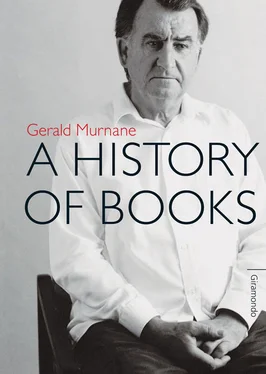The book mentioned was described by its publisher as a frank and revealing autobiography. The author was an Englishman and a contemporary of the man who had read at least part of the book but had later seemed to forget it. Before the book had been published, its author had become famous as the author of many books of the sort known as science fiction. The title of the autobiography was a play on words, one of its two possible meanings being that the author as a boy and as a young man had been an habitual masturbator.
The man seeing the mental image of the young woman on the swing could hardly believe that such an image-person or such an image-swing had been mentioned in the autobiography. The young image-woman had the image-clothes and the image-hair-style of an upper-class young woman of the eighteenth century, and even the dense image-foliage behind her was such as the man had seen only in illustrations of paintings from long before his own time.
From his reading of the autobiography the man retained only two memories. He remembered that he had left off reading towards the end of the book and had never afterwards resumed. He remembered also an image that had surely appeared to him during his reading: an image of a girl or a young woman seated in a shabby armchair in a small house in a working-class suburb of a provincial city in England: near the girl or the young woman were two boys or boy-men.
The man supposed that the image of the young woman on the swing was derived from some or another illustration that he had seen at the time when he was reading part of the autobiography mentioned. The man himself knew little about the so-called visual arts, but he remembered that his wife had bought each week for their children, more than twenty years before, one after another illustrated segment of a series with the title GREAT ARTISTS. Having remembered this, the man visited the home of the son of his who was presently the custodian of the series mentioned.
In his son’s house, the man saw, on the cover of a certain segment of the series mentioned, an illustration of a painting of a young woman seated on a swing and rising high into the air. The man learned from an inspection of the illustration that the painting included two other image-persons apart from the young image-woman. These two were an image-man who was pushing the young image-woman from behind and an image-man who was lying beneath the image-swing and was gazing upwards at the exposed image-thighs of the young image-woman. The man later learned from the passages of text accompanying the illustration that the young image-woman was the wife of the image-man who was pushing her from behind and was the mistress of the image-man who was gazing at her image-thighs. The man understood from what he read that the painting of the young woman and of the two men was considered a masterpiece.
The man who is the subject of this passage of fiction often found himself living in his mind the image-life of some or another image-person who had taken his interest in some or another work of fiction that he was reading. The man sometimes found himself living in his mind, if only for a few moments, the image-life of some or another image-person who had taken his interest in some or another illustration that he was looking at. While the man stared at the illustration of the painting that was reported to be a masterpiece, he was not at all interested in living in his mind, even for a few moments, the image-life of the image-man standing behind the young image-woman or of the image-man lying among the image-foliage beneath her. He felt no wish to be, even for a few moments, the husband or the lover of the young image-woman in the purported masterpiece. Even though he remembered having left off reading the autobiography mentioned earlier, the man would have preferred to live the image-life of one of the image-boys or image-boy-men in the shabby image-house in the provincial image-city mentioned earlier: to have stood, whenever the need arose, with his imagebrother in front of their image-sister; to have masturbated promptly; and afterwards to have gone back to his task of trying to write fiction.
In the mind of a young man of about twenty-five years, an image appeared of a young woman, hardly more than a girl, who sat on an image-plank suspended by image-ropes from an image-branch and who moved herself backwards and forwards by pushing a bare foot against the soil beneath her. In the mind of the same young man were also image-sounds, as though the young image-woman sang part of an image-song while she moved backwards and forwards or as though an image-radio, out of sight in the image-background, broadcast the image-words In the Blue Ridge Mountains of Virginia set to an image-tune that he, the young man, would never afterwards succeed in remembering.
The young man mentioned made no attempt to draw nearer in his mind to the young image-woman mentioned but went on watching her from the distance that seemed to have been fixed between them. He suspected that his trying to approach might cause her image to retreat into the image-background, which seemed to consist at first of fold after fold of dark-blue imagemountains in the upper right-hand corner of a topographical image-map of the United States of America and later of the grey-blue image-haze that was the farthest image-sight in all image-landscapes. Rather than try to approach the young image-woman, the young man tried to fix her in his mind. He had not yet learned that it was not in his power to fix any sort of image in his mind; that he had no need so to fix any image; that every image in his mind was already fixed there and would remain there, even though he might seem at times unable to recall one or another such image. Nor had the young man yet learned that he might have been himself watched from a distance by some or another entity whose image he had once watched from a distance and had tried to fix in his mind but had afterwards lost sight of.
The young man had listened, as a boy of ten years, to part of a certain program broadcast by radio. Not having heard the earlier part of the program, the boy did not know what had caused the two chief personages to become separated from one another as young persons so that they had to spend their later lives searching for one another in one after another landscape or city of the United States of America. Towards the end of the program, the boy’s mother had turned off the radio, as a result of which the boy had not learned until nearly fifteen years later, when he read as a young man the long poem from which the radio program had been adapted, that the two separated personages had finally met up with one another when the male personage was on his deathbed. Sometimes during the fifteen years mentioned, he who had been the boy mentioned had heard in his mind the voices of a male and a female personage calling to one another as two such voices had once called during part of the radio program mentioned. Sometimes, during those fifteen years, he who had been the boy mentioned had supposed that the personages were separated because the female of the two had died and because her spirit had not then gone to heaven or to any such afterworld but had travelled through the United States of America in search of the male personage. On one after another prairie or beside one after another wide river or among one after another range of mountains, the spirit personage was perhaps able to look out for and finally, even, to see the living personage, but the living personage could never look out for or see the spirit personage. If the two were to meet up at last, they could hope for no more than that the spirit personage, the female of the two, might become a presence fixed in the mind of the living personage, the male of the two.
The young male person who was aware of what is reported in the previous paragraph knew about the landscapes of the United States of America only what he had learned from a few films and from a few copies of the National Geographic Magazine . Knowing only this, and not knowing that the separated personages mentioned were reported in the text of a poem as having met up at last when the male of the two was dying in a city in the north-east of the country, the young male person, whenever he hoped that the separated personages would meet up at last, chose to suppose that they met up at last in a landscape such as he had studied in a certain illustration in one of the first issues that he had ever seen of the National Geographic Magazine , which illustration was of fold after fold of dark-blue mountains near the border of the state of West Virginia.
Читать дальше












